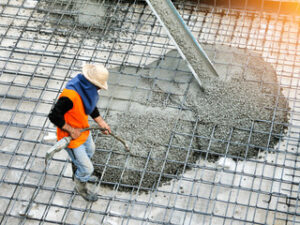Concrete contractors do what they do for a lot of different reasons. They love the work and take pride in building projects that will be around for decades.

They get satisfaction from working hard and moving up through the ranks. They also enjoy the money they make. Checkout https://www.levelgroundexcavation.com/ for more information.
Choosing a concrete contractor that has experience is essential to getting quality workmanship on your project. They can help ensure that your concrete is properly mixed, poured, and cured.
The first thing to look for when selecting a concrete contractor is their experience. It’s important to choose a contractor who has years of experience in the industry because it will ensure that your project is done correctly and stays within budget. A professional concrete contractor should also be able to provide you with examples of previous work they have completed.
Concrete contractors with years of experience are often able to provide you with insights and recommendations that can help your project run smoothly. They will know how to properly prepare the materials for your concrete installation and can provide you with a variety of different options for style, customization, and finishing techniques that will make your finished product unique and attractive.
Many people choose to become a concrete contractor by starting out as a laborer or taking on an apprenticeship. This option can be more time consuming than pursuing a bachelor’s degree, but it is an excellent way to learn the skills required for this career and begin your journey toward becoming a concrete contractor.
In order to be a concrete contractor, you will need to have a valid license in your state. Licensing requirements vary by state, so it is important to check with your local authorities before beginning your journey towards being a concrete contractor. Licensing will also allow you to avoid hiring unscrupulous companies who may not be licensed or insured, which could lead to serious consequences if something goes wrong on the job site.
Typically, certified concrete contractors create agreements with a supplier who will supply them with the pre-mixed concrete they need for projects. This can save them money and hassle because they don’t have to worry about preparing the concrete themselves. Additionally, they will be able to schedule delivery dates for the concrete and have access to other necessary supplies such as wood for forms and aggregates.
It is important to select a certified concrete contractor for your commercial construction project. A reliable and experienced company can help you stay on budget and will ensure that your concrete project is completed properly to protect the investment you have made. You can find more information about choosing the right concrete contractor by checking online reviews and contacting references before making your final decision.
Licensing
A concrete contractor must be licensed to work in the construction industry. Licensing requirements vary by state, but most require concrete contractors to pass a written test and demonstrate that they have the experience to do the job. They also need to be bonded, which means they put money aside in case of disputes. This ensures that the concrete contractor will do the work they promise and not disappear with your money.
Concrete is a versatile material that can take on many forms. In order to create the desired shape, a concrete contractor must use formwork. This process is labor-intensive and can be expensive, but it is necessary to get the job done right. Some concrete contractors specialize in pre-fabricated formwork that makes this step less time consuming and more cost-effective. Licensed concrete contractors use these innovations to stay competitive and improve the quality of their work.
Another important aspect of a concrete contractor’s licensing is that they must have general liability insurance. This protects you in case they are injured while working on your project or damage your property. The company’s insurance will cover the costs of treatment, so you do not have to pay for it out of your own pocket.
In addition to these general requirements, a concrete contractor must be familiar with local building codes and regulations. This ensures that they will follow all the rules and regulations in place for your specific location, so you can be sure that your finished product is safe to use.
Having the right equipment is vital for concrete contractors to do their job. They must have the proper tools to mix and pour concrete, as well as to finish it. They may need to rent or buy specialized tools depending on the job at hand, but they should always have a few key pieces of equipment on hand. These include a level, tape measure, shovel, wheelbarrow, and broom. Concrete contractors must also have a strong understanding of how to use these tools safely and properly.
Insurance
Concrete contractors often need a variety of business insurance policies. They work on other people’s property, and they may have equipment that could damage their customers’ property. Liability insurance for concrete contractors helps cover damages and legal fees in these situations.
Most states require workers’ compensation for employees, but other types of business insurance may also be necessary. For example, if your company vehicles are damaged or destroyed while transporting materials to job sites, commercial auto insurance may help pay for repairs and replacements. Similarly, if one of your employees is injured while working on a construction site, medical payments coverage can help pay for things like ambulance rides, doctor visits, x-rays, surgery, and ongoing rehabilitation costs.
Another type of business insurance that many concrete contractors need is general liability. This policy covers third-party property damage and injury claims, such as a lawsuit over a concrete truck tracked across a customer’s floor. It’s sometimes bundled with commercial property insurance for savings in a business owners policy (BOP).
If your company uses rented office space, or you store tools and equipment in a warehouse, you should consider getting inland marine coverage. This type of insurance may help protect your assets from theft, vandalism, fires, and other problems that could arise while your stuff is in transit between jobs or stored away from the main office.
The cost of these insurance policies will depend on factors such as the size and location of your business, how much risk you’re willing to take, and your past record. A clean record with no accidents or claims may lead to lower premiums, while a large number of employees or a history of claims will increase your rates. The type of insurance you need will also depend on the type of construction project you’re taking on, as some types of projects carry more risk than others. Speak with a professional insurance agent to learn more about the different types of business insurance available for concrete contractors, and which ones are right for you. They can provide quotes from top-rated U.S. insurance providers and help you find the perfect plan to meet your needs.
Equipment
Concrete contractors rely on a variety of tools to perform their work. The right equipment helps them perform their work efficiently and with high quality. In addition to a full set of basic hand tools, they also use power drills and other large-scale construction equipment.
The equipment a concrete contractor uses depends on the type of construction project. Commercial concrete projects typically require more complex and larger-scale equipment than residential projects.
For example, a commercial concrete contractor may need a concrete batching plant to mix the concrete on-site rather than having it pre-mixed in a truck. This saves time and money for the company.
A concrete contractor will need a set of hand tools for demolition, cutting and forming the concrete. In addition, they must have the proper tools for leveling and finishing. For example, a long-line level is useful for verifying the slab surface is flat before pouring concrete. Laser levels offer greater accuracy and reduce human error on the job site. Concrete workers also need a variety of hand or power trowels, as well as hand tools for grinding, sawing and laying reinforcement bars. Safety glasses are essential on the job site to protect eyes from dust and debris while working with construction materials and equipment.
In addition to the tools and equipment, a concrete contractor will need to keep an inventory of supplies for their business. These include cement, aggregates and water for mixing and concrete construction. It’s important for a concrete contractor to know the specific properties of each ingredient and how they affect the final product.
Other essential supplies for a concrete contractor are work gloves and protective clothing. It is also helpful to have a hard hat, work boots and a first aid kit available in case of an emergency. A hazard analysis is also necessary to assess the risks of a jobsite and determine if any safety measures are needed.
Once a concrete contractor is familiar with the equipment and supplies they need to start their business, they can focus on building a team of reliable employees. This can be done by reaching out to friends and family members for recommendations, as well as reaching out to local concrete supply companies for referrals. Once a concrete contractor has a team in place, they can start taking on clients and starting new projects.



